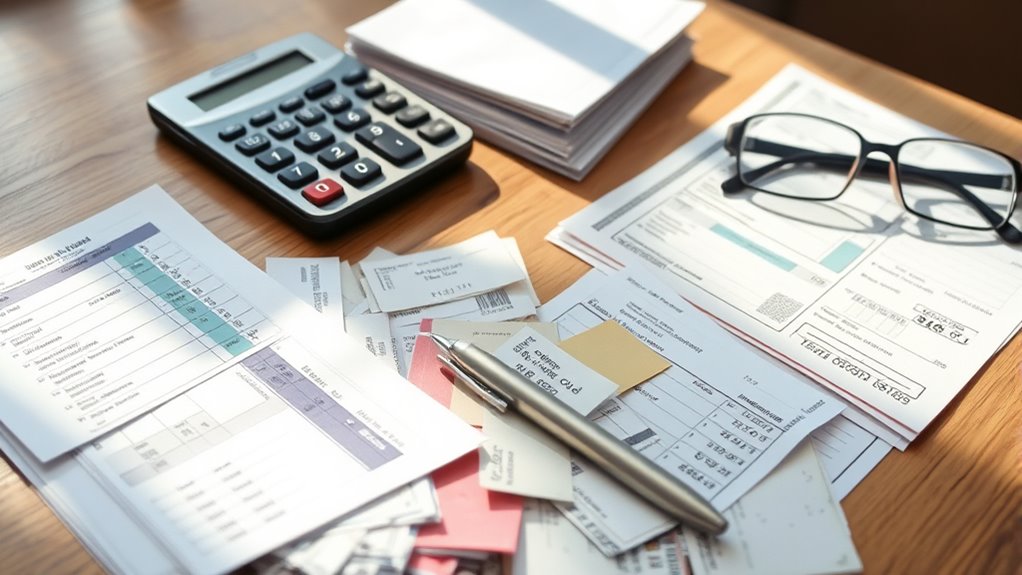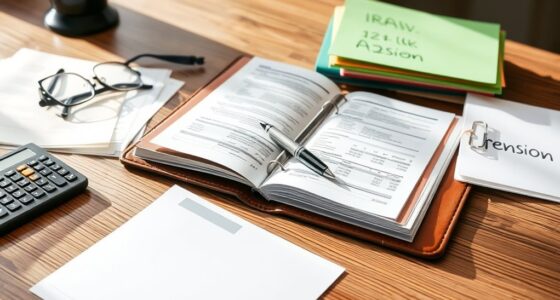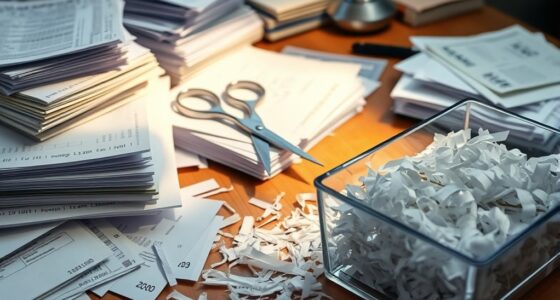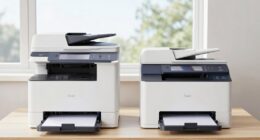To handle your taxes correctly, you need to keep important forms, receipts, and records like W-2s, 1099s, and receipts for deductions such as medical, charitable, and business expenses. Store digital copies and physical papers securely to guarantee you have proof for your income and deductions. Organizing these documents throughout the year will help you avoid errors and prepare for audits. Keep going to discover tips that can make this process easier.
Key Takeaways
- Keep all income documents such as W-2s, 1099s, and 1098s for accurate reporting and IRS compliance.
- Retain receipts and records for deductible expenses including business, medical, charitable, and educational costs.
- Maintain organized records of assets purchased or sold, like real estate or investments, with supporting documentation.
- Store digital and physical copies of tax-related documents securely to support deductions and during audits.
- Regularly review and update your records throughout the year to ensure readiness for filing and potential IRS inquiries.
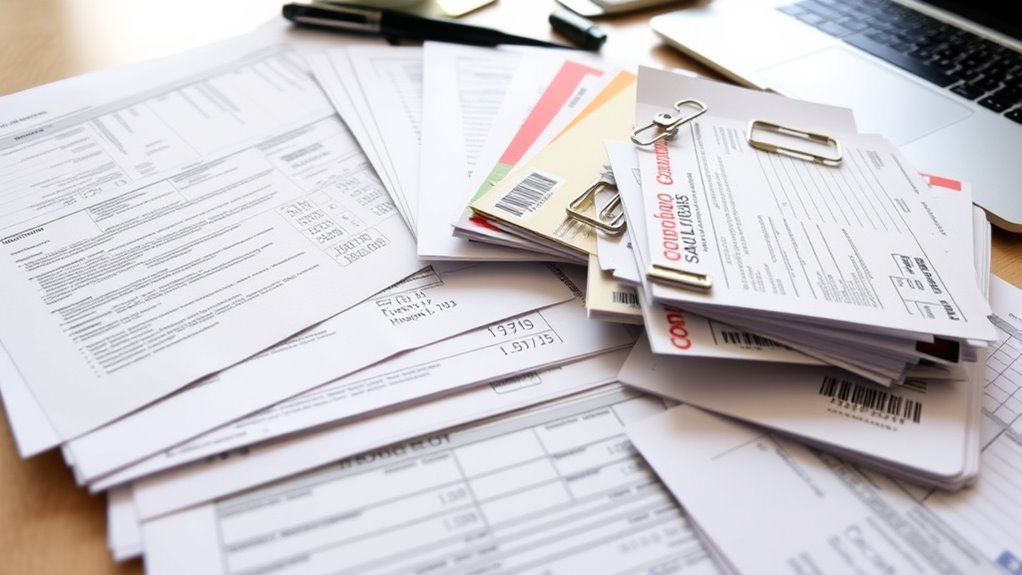
Tax documents are essential tools for accurately filing your income taxes and ensuring you stay compliant with IRS requirements. Without proper records, you risk missing out on valuable deductions or facing penalties if audited. Keeping organized and thorough documentation makes tax time much smoother and helps you implement effective tax deduction strategies. It’s also your best defense during an IRS audit, providing proof of your claims and expenses.
Proper recordkeeping ensures accurate tax filing, maximizes deductions, and strengthens your defense during IRS audits.
Start by gathering all relevant forms you receive, such as W-2s, 1099s, and 1098s. These documents report your income from employers, contractors, and financial institutions. Don’t forget about receipts and records related to deductible expenses—these are vital when trying to maximize your tax deduction strategies. For example, keep receipts for business expenses, medical costs, charitable donations, and educational expenses. Digital copies are acceptable, but make sure they’re clear and easily accessible.
In addition to income and expense records, maintain records of any assets you purchase or sell, including real estate or investments. These documents can impact your capital gains calculations and potential deductions. Also, keep track of mortgage interest statements and property tax records, as these can provide significant deductions if you itemize. Staying organized with these documents throughout the year will save you time and stress when it’s time to file.
It’s equally important to keep copies of previous years’ tax returns and supporting documents. This helps you compare year-over-year data and provides a reference point if the IRS requests clarification or conducts an audit. Maintaining detailed records also allows you to spot errors or discrepancies early, avoiding costly corrections later.
When it comes to IRS audit tips, thorough documentation is your best strategy. If you’re ever audited, the IRS will want to see proof of your deductions and income. Well-organized records showing receipts, bank statements, and correspondence can make the process much less intimidating. Keep digital backups of all important documents, and store physical copies securely in a safe location. Regularly reviewing your records ensures you’re prepared and can substantiate your claims confidently.
Additionally, understanding how to juice fruits and vegetables can be a great way to incorporate healthy, natural ingredients into your diet, supporting overall wellness and financial savings on processed beverages. Staying organized with these documents throughout the year will save you time and stress when it’s time to file.
In short, the key to effective tax management is diligent recordkeeping. By collecting and maintaining detailed documentation, you’ll be better positioned to optimize your tax deductions, comply with IRS rules, and respond swiftly to any audit inquiries. Staying organized isn’t just about compliance; it’s about empowering yourself with the information you need to make informed financial decisions year-round.
Frequently Asked Questions
How Long Should I Keep My Tax Records?
You should keep your tax records for at least three years, but it’s wise to follow record retention policies and keep them longer if you suspect audit or need proof for deductions. Digital storage options make it easy to organize and access these documents securely. Stay proactive by maintaining records for seven years if you’ve filed a claim for a loss or suspect you might need them later.
Can I Store Documents Digitally?
Think of digital storage like a vault for your important documents. Yes, you can store your tax records digitally using cloud backups or secure drives. I once kept my receipts on a cloud service, and when I lost my physical folder, I was relieved to find everything intact online. Just guarantee your digital storage is reliable and backed up regularly to protect against data loss.
What Records Are Needed for Self-Employment?
For self-employment, you need to keep detailed records of your business expenses, including receipts, invoices, and bank statements. Track all income and expenses related to your business to claim tax deductions accurately. Maintain records of mileage, supplies, and equipment purchases. Keeping organized records guarantees you can substantiate your deductions and income if audited, making tax time smoother and helping maximize your tax benefits.
Are There Specific Documents for Rental Income?
Yes, you need specific documents for rental income. Keep thorough rental income documentation, including records of all rental payments received. Save rental property receipts that detail rent payments, security deposits, and any related expenses. These documents help you accurately report income and deductions on your tax return. Staying organized with these records guarantees you’re prepared for audits and simplifies the filing process, giving you peace of mind.
How Do I Organize My Tax Documents Efficiently?
To organize your tax documents efficiently, start by creating a clear filing system with labeled folders for different categories like income, expenses, and deductions. Use document scanning to digitize receipts and important papers, reducing clutter and making retrieval easier. Keep physical copies in a secure place. Regularly update your system, backing up digital files, so you can quickly access everything when tax season arrives.
Conclusion
By keeping all your tax documents organized, you’re protecting yourself from potential audits and making tax season much easier. Imagine losing your receipts for a vital deduction, only to face penalties later. For example, Sarah thought she had everything in order but missed a key medical expense, costing her hundreds. Don’t let disorganization cause stress or financial setbacks. Stay diligent with your records, and you’ll navigate tax time confidently and securely.
